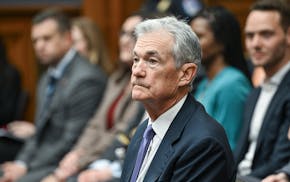Elaine Happ and Dave Perry planned to get married on Jan. 20, 2010, in Manzanillo, Mexico. They're both optometrists in the Twin Cities, and they liked the idea of having 20-20 -- as in perfect vision -- in their wedding date.
But their 18 months of planning went down the drain early this month when they learned that Delta Air Lines cut all direct flights, including their full flight, from the Twin Cities to Manzanillo, leaving the couple without enough time to get themselves and friends and relatives rebooked on other flights without lots of added expense.
Now, their new date is Feb. 17, four days after Delta says it plans to resume the direct flights. But besides missing out on their dream wedding date, they're left knowing that their friends and relatives are stuck paying nearly $1,000 total in additional ticketing charges. And at least one couple can't make the new date work.
Theirs is one of numerous stories told by travelers caught up as airlines cut capacity -- by reducing flights and switching to bigger planes -- to save money as they struggle to lure passengers back and boost revenue. But the schedule switches, often from nonstop to a layover, and packed planes are a rude welcome back for travelers.
"There's not a lot of traffic to Manzanillo, and they're not going to operate planes that are half full," said George Wozniak, owner of Hobbit Travel in Minneapolis. "It's unfortunate if you're one of the people that has picked that destination and you're specific on a date. All of a sudden, what do you do?"
While there are no concrete numbers on how many flights have been cut or redirected, travel experts say it's been on the rise. All airlines have trimmed their flight networks by 10 to 20 percent over this time last year, said Joe Brancatelli, who publishes a newsletter for business travelers called JoeSentMe.com.
"That leaves fewer stops and more annoying connecting and more changes," he said.
Airlines will try to rebook passengers for what makes sense for the airline, such as flights with the lightest loads, not what's the most logical connection for the passenger, he said.
"The thing the customer needs to do is fight back, not roll over, check the existing schedule and demand the most logical rebooking," he said.
When an airline changes a flight, the passenger doesn't pay. "But if you don't like the way they have rebooked you and you want to change the rebooking, they will sometimes claim you are trying to make the change and want to impose the fee," he said.
Delta said it does not break down how many flights have been cut at each hub. Its policy when a flight is canceled is to offer a refund or put the passenger on a different flight.
One flight, three changes
The Copland family of Edina bought four Northwest Airlines tickets last winter to travel to Buffalo, N.Y., in July. What had been originally a nonstop flight for a "good fare" of about $240 turned into a very early morning flight with a layover in Detroit, something they did not want to do with two kids in tow.
"So I changed it to something else, rerouting through Detroit at better times," said Lucia Copland. "But about a month later, it happened again. They changed our flight and said here's your new itinerary." Again, it was a very early departure.
After changing that flight to a better time, Copland said she started getting suspicious. "I begin to think they are doing this to us because we got such a good fare that they're now trying to put us on flights at the least-popular times."
The next change was only by about 20 minutes. "Thank goodness," she said. "Because I was getting ready to go through the roof."
Delta spokeswoman Susan Elliott said the airline's top priority when rebooking a passenger is to try to get the time as close to their original flight as possible. Availability also is a factor, she said.
"The end game for us is to get a passenger to their final destination as close to their original time as possible," she said.
Things started to go downhill for Happ Nov. 4, when her travel agent called and said: "I don't have good news."
Happ and Perry's direct flight, which they had booked over the summer, had been canceled, along with the direct flights to Manzanillo that the couple's eight adult children were on. Other attendees: A couple from California and a maid of honor, who was on a direct Continental flight from the Twin Cities to Manzanillo.
The travel agent told Happ she would need to make some quick decisions to still get everyone to the wedding because other flights to Manzanillo were filling up. Their options: get a refund, rebook for after Feb. 13 or fly to Puerta Vallarta, which would have meant a three-hour car ride through the mountains.
"To me, the only logical way to do it was to postpone it to February when they start flying there again," she said.
But what really irks her is the fees some of the wedding party are stuck with. Dave's son and wife had to pay $100 each to change their flights from Oregon. The maid of honor's original ticket was bought with frequent-flier miles. Cost of a new ticket: $680. The friends from California were going to have to pay $150 each to change tickets, but they were unable to make the new dates work and won't be attending.
What she really wants is for Delta to pay the penalties. "It's not right we have to pay because Delta chose not to fly there anymore," said Happ, who owns Uptown Eye Care in Monticello, Minn. Perry owns White Bear Eye Clinic.
Minneapolis travel expert Terry Trippler acknowledged that air carriers are struggling and need to cut back on flights. To him, though, what's important is how they treat the passenger after the flight is cut.
"When they make that change, they know full well that they have your money," he said. If they do change either the time or switch from a nonstop to direct, the airline needs to make it right for the passenger, whether it's putting them on another airline at a time that works or paying for a hotel room, he said.
Suzanne Ziegler • 612-673-1707
Participant, studio behind 'Spotlight,' 'An Inconvenient Truth,' shutters after 20 years

Fed's Powell: Elevated inflation will likely delay rate cuts this year

